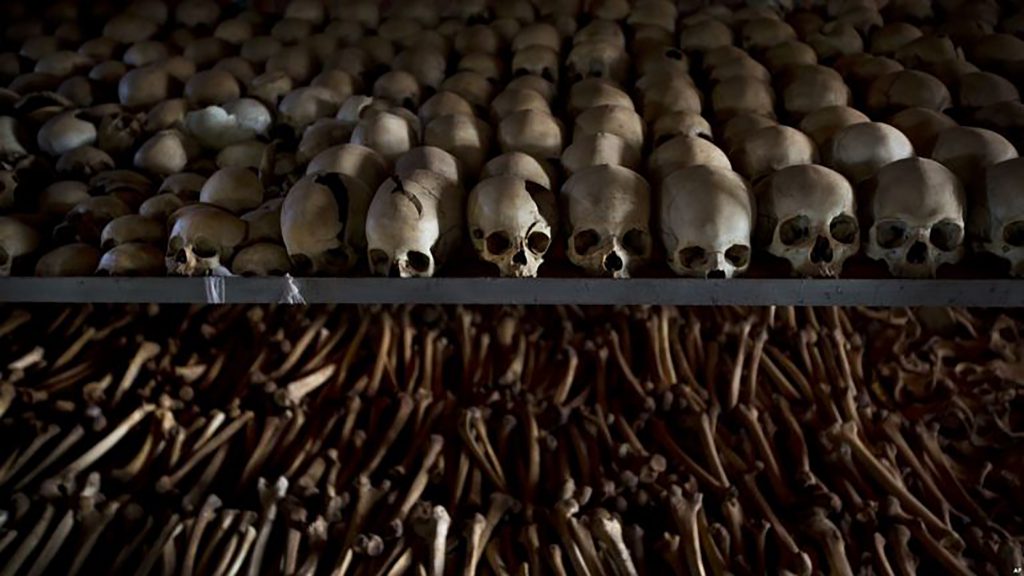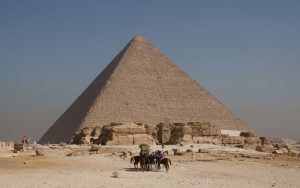In Rwanda there are two ethic groups: the Hutu, which makes up the majority of the population, and the Tutsi, the minority. Tensions between these two groups have been going on for years, so was not surprising that their conflicts would eventually escalate drastically. Despite their differences, they were actually very similar. The two groups have shared the same locations as to where they choose to live, the traditions they follow, and also the language that they speak. At a glance, they look very similar; but Tutsis tend to be taller and slimmer than the Hutus.

Hutu dislike for the Tutsi came about when the Belgians, who once dominated the region of Rwanda, considered the Tutsis to be superior to the Hutus. The Belgians gave the Tutsis better education, and even granted them better jobs than the Hutus. In 1959, a series of riots broke out in Rwanda. Many fled to Burundi, Tanzania, and also to Uganda.1 Unfortunately, 20,000 Tutsis were killed during the riots. In 1962, Belgium relinquished its power over Rwanda, and it was given its independence. The second President of Rwanda, Juvenal Habyarimana, who had been a dictator in power since 1973, and who was also a Hutu, began to lose popularity when the Hutus took over the government and the economy weakened. This is when Paul Kagame, a Tutsi, founded the Rwandan Patriotic Front (RPF) to try and overthrow the president. After much violence, the two sides, the RPF and Habyarimana, signed a peace accord in mid-1993. But on April 6, 1994, the President’s plane was shot down, killing both Habyarimana and the President of Burundi, Cyprien Ntaryamira; and things started to go badly wrong in Rwanda.
After the plane was shot down, the preexisting tensions between the Hutus and the Tutsis quickly flared up. No one knows who shot the plane down, but the Hutus quickly pointed the finger at the Tutsis. Conflict between the two neighboring tribes was nothing new in the central African nation of Rwanda, but the downing of the president’s plane was the final straw for the Hutus. Paul Kagame was accused by the leaderless Hutu government for being responsible for the plane crash and death of Habyarimana.2 Kagame denied this accusation and said that he had nothing to do with it, but news of the death of President Habyarimana spread across the country.
Shortly after the start of Rwanda’s genocide, Rwanda’s government initiated a campaign of retribution, and began to target Tutsis. In just hours, recruits from Hutu groups, government soldiers, and militias were sent to kill the Titus population, a Tutsi-minority tribe living in Rwanda. They were given radios to help them coordinate target groups of people. The recruits were sent into Tutsi cities where they started killing any Tutsi in sight with automatic weapons. For over the one-hundred days, more and more Hutus joined the killing squads, either by force of the government or voluntarily. They started to use machetes, spears, knives, and also masu, which is a thick club with nails sticking out of it. It even got to the point where everyday objects were used.3 They would have screwdrivers, bicycle handle bars, and hammers in one hand, and in the other a radio waiting to hear their next directive. They blew up churches where the Tutsi people were going into hiding to protect themselves, but the churches turned into death sites, trapping those inside when the churches were set on fire. Citizens of the Hutus were even being forced to go and kill the Tutsi people. They were given offers of food and money, and even told that could take the land of a Hutu if they killed them.

American President Bill Clinton did little to stop the massacre, even ignoring the obvious warnings about the killing that would take place after Habyarimana’s plane had crashed.4 Even other countries, like France and Belgium, along with the United States and the United Nations, knew what was about to occur, and wouldn’t take the initiative to try to stop it. For weeks these countries refused to use their moral and political authority to go against the genocidal government of Rwanda. The United States could have done much more to help out a country that was in need. Even a little bit of help would have been something, and maybe a significant number of people wouldn’t have lost their lives. While the American Congress was looking to the President to take action, Clinton was looking to the United Nations to take action. Since nothing was being done, sadly the killing just continued.
The only reason the genocide in Rwanda ended was because of the determination of the RPF. They fought back against the killing squads, and defeated the government’s soldiers. When they took control, Paul Kagame became the Vice President and Minister of Defense. With everything said and done, 800,000 Tutsi men, women, and children were killed from roughly 200,000 participants.5 There were 75,000 children that became orphans. Between 250,000 and 500,000 Tutsi women were raped, resulting in around 20,000 children being born as a result. The HIV virus and AIDS were used as another weapon, with 67% of the women that were raped being infected. If someone would have stepped up before this all unfolded, this would have been prevented and so many people wouldn’t have lost their lives or experience life changing events.
- Samantha Power, A Problem From Hell (New York: Basic Books, 2002) 342-347. ↵
- Samantha Power, A Problem From Hell (New York: Basic Books, 2002) 335-339. ↵
- Encyclopedia of Political Communication, 2008, s.v. “Rwanda Genocide, Role of Media,” by Frank Wittmann. ↵
- Samantha Power, A Problem From Hell (New York: Basic Books, 2002) 353-361. ↵
- Anna-Marie de Beer and Elisabeth Snyman, “Shadows of life, death and survival in the aftermath of the Rwandan Genocide,” Tydskrif vir Letterkunde vol. 52 issue 1 (Autumn 2015): 18. ↵



75 comments
Valeria Hernandez
Troy Leonard talks about the Rwanda’s Genocide of 1994 a gruesome phenomenon that marked the history of Rwanda. I had never heard of this horrible genocide which impressed me a great deal because of the minimal coverage. Leonard gives readers great information about a sad event by providing background information and giving the cause that leads to the genocide. Providing us with the political ordeal.
Samuel Stallcup
This genocide seems way too political, and it reminds me of a more violent Cold War. The Hutus and Tutsis remind me of the United States and Russia (USSR), respectively, for during the Cold War both countries were very bitter towards one another. Like these two tribes, they would often try to create propaganda to bring their country to hate the other. However, on the topic of this article, the article was great and very detailed.
Rebekah Esquivel
I had previously heard about Rwanda in my high school history classes and it wasn’t in as much detail as this article. This was truly shocking. To see that no one did anything to help these people was really sad to read as these tragedies could have been prevented or at least lessened. I think it is so sad how people can think it’s okay to send troops to kill innocent people who have no chance in fighting back. This was a very well put together article and it definitely taught me a lot about this horrifying event in history.
Marco Picardo
This was an article that was really deep and caused a lot of emotions. I remember reading Hotel Rwanda and learning about the genocide. I remembered being fascinated with the fact that people could become so monstrous and kill their own kind. I never understood. I also never understood why the UN didn’t really intervene. Such a sad an terrible story that we must not forget.
Richard Navarro
This article is crazy and fascinating, it is sad to read the story of Rwanda and how many people lost their lives. It makes me kind of want to watch the movie. It is sad to see how many people did not even try to get involved yet we can shove our way into other countries in order to make their problems our problems. This genocide is absolutely horrific.
Troy Leonard
before I wrote this article I had just a little knowledge about the genocide that took place in Rwanda. I was really interested in the topic when I heard bout it in high school I wanted to learn more about what happened and why it took place. it was a very sad event that took place and it left a lot of traumatized children. I feel like it was a lot of things that could have been don’t to avoid this.
Robert Rees
I had heard of Rwanda’s genocide before, but only knew enough information to say a genocide had occurred. I did not know any of the horrific details regarding this unfortunate tragedy. This article does well to inform the reader about a tragedy that could have possibly been ended sooner. Perhaps another read through on your next article would be a good decision, as there were a few mistakes that did require me to go back and read over some sentences.
Jesica Rivera
Before encountering this article I had never been informed on the Rwanda’s genocide. It is a tragic topic but it was still very interesting topic to learn about. I find it baffling how the UN and many powerful nations did not step in, in hopes someone else would. It is also very perplexing how people who share almost identical lifestyles and traditions are still divided by their past.
Josemaria Soriano
A really shocking article . I had heard about the Rwandan massacre before, because it was a historical event that happened on my birthday (April 6th). It is unfortunate that a so tragic story as this one is not known by the vast majority of people, because it did not happen in a country that is a protagonist of our society such as France or Germany, for example. The massacre of Rwanda was an atrocity that shows us the destructive power of society, and the most incredible thing is that all those deaths came with cold weapons. When a country is in trouble, the solution is not to kill each other, but to work together to achieve development. I conclude my comment by recalling Hobbes, when he argued that a human group without government slaughtered itself. Unfortunately, events like this make us think that the writer of Leviathan was right.
Luke Willis
This was a great article I have heard of the Rwanda genocide before but I did not know a single thing about it. It is very upsetting that nothing was done about the genocide and that no other country came to help the Tutsi people and stop the killings. It shows how weak not only our own president was but all the other leaders who refused to do anything. It was an unfair fight from the beginning and it should have been stopped much sooner.